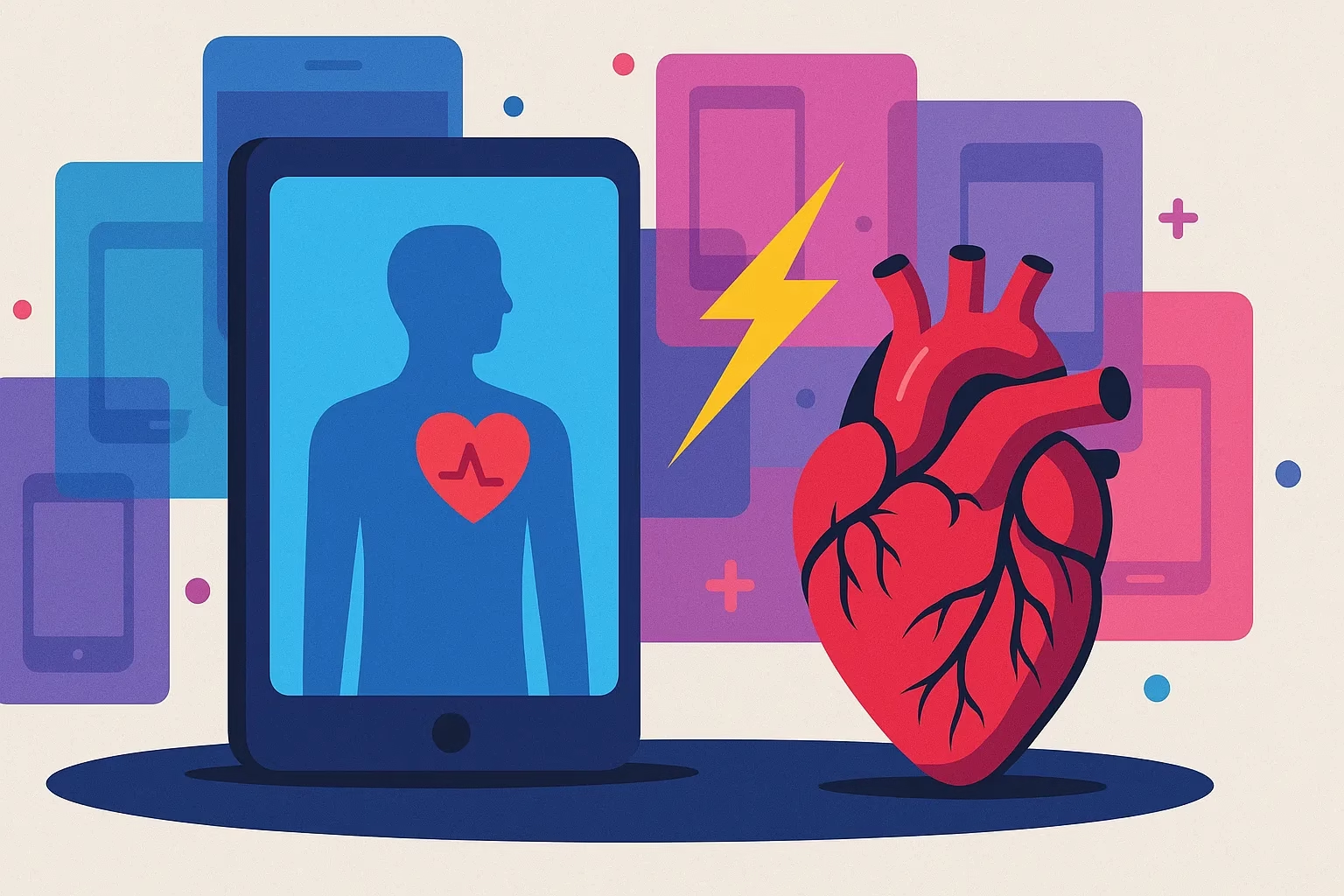In today’s digital world, screens are everywhere—from phones and tablets to TVs and computers. While screens offer entertainment and learning opportunities, excessive screen time among children and adolescents may pose serious risks to their heart and metabolic health.
Recent cutting-edge research from Denmark and other studies reveal that spending too many hours on screens is linked to early signs of heart disease risk factors like high blood pressure, unhealthy cholesterol, and insulin resistance. These effects are especially pronounced in young people who don’t get enough sleep.
What the Research Shows
A major study published in the Journal of the American Heart Association analyzed data from more than 1,000 Danish children and teens aged 10 and 18. Researchers measured their screen use for leisure and tested markers related to heart and metabolic health, such as blood pressure, HDL (“good”) cholesterol, blood sugar, triglycerides, and waist size.
- Each extra hour of daily screen time increased youths’ combined heart risk score by 0.08 standard deviations at age 10 and 0.13 at age 18.
- This may not seem large—but when accumulated over 3 to 6 hours a day, as many adolescents experience, it adds up to a meaningful uptick in early heart disease risk.
- Youth who slept less showed even greater risk linked to screen time, highlighting the critical role of adequate sleep to protect heart health.
- Researchers also found a “screen-time fingerprint” in blood metabolites, biological markers reflecting the negative impact of screen habits.
Other recent studies corroborate these findings, showing consistent links between higher screen time and increased risk of metabolic syndrome (a cluster of heart risk factors) among children and adolescents.
How Sleep Matters
Sleep plays a key role in moderating the damage linked to screen time:
- Shorter sleep duration and later bedtimes intensified the association between screen use and heart risk.
- About 12% of the relationship between screen habits and cardiometabolic risk was explained by insufficient sleep.
- Promoting better sleep habits could partly counteract the harmful effects of screen overuse on heart and metabolic health.
Practical Tips for Families
Experts recommend building healthier screen habits alongside prioritizing sleep:
- Limit recreational screen time, especially for children and teens, aiming ideally for under 2 hours daily.
- Encourage earlier and consistent bedtimes to ensure sufficient sleep.
- Adults should model balanced screen use and set clear boundaries around device use.
- Support kids in developing non-screen activities to foster creativity, resilience, and physical activity.
- Pediatricians are encouraged to discuss screen time and sleep regularly during health visits for early prevention.
Why It Matters
Heart disease is the leading cause of death worldwide, often developing silently starting in childhood. The habits formed early can shape lifelong health risks. Understanding that excessive screen time coupled with poor sleep may accelerate early signs of heart and metabolic disease is a crucial step. This knowledge empowers families and healthcare providers to take action that protects the next generation’s heart health.
What You Can Do to Protect Heart Health
Taking steps now can make a lasting difference in preventing heart risk linked to screen use:
- Set daily screen time limits: The American Academy of Pediatrics recommends no more than 1 to 2 hours of recreational screen time for children and teens.
- Prioritize good sleep hygiene: Create a regular bedtime routine that avoids screens at least one hour before sleeping to improve sleep quality.
- Encourage physical activity: Aim for at least 60 minutes of moderate to vigorous exercise daily to support heart and metabolic health.
- Create screen-free zones: Designate areas and times, such as during meals or the first hour after waking, where screen use is not allowed.
- Model healthy habits: Adults should demonstrate balanced use of digital devices and engage in active, screen-free family time.
- Offer alternative activities: Promote hobbies, outdoor play, reading, and social interactions that do not involve screens.
These simple steps can help reduce heart risk factors early, fostering healthier habits that last a lifetime.
Summary Table
| Factor | Key Details |
|---|---|
| Study Sample | 1,000+ Danish children & adolescents (ages 10 and 18) |
| Screen Time Types | TV, movies, gaming, phones, tablets, computers for leisure |
| Average Screen Time | 2 hrs/day at age 6, 3.2 hrs/day at age 10, 6+ hrs/day at 18 |
| Cardiometabolic Markers | Blood pressure, HDL cholesterol, triglycerides, blood sugar, waist size |
| Screen Time Impact | +0.08 SD heart risk per extra hr at age 10, +0.13 SD at 18 |
| Role of Sleep | Shorter sleep amplifies risk; mediates ~12% of the effect |
| Biological Evidence | “Screen-time fingerprint” found in blood metabolite profiles |
| Recommendations | Limit screen time; improve sleep; adults model healthy habits |
Key Takeaways in Bullet Points
- Excessive screen time in childhood and adolescence is linked to higher cardiometabolic and heart disease risks.
- Risks increase with every additional hour spent on screens and are worsened by less sleep.
- Sleep deprivation partly explains how screens increase heart risk, highlighting the importance of sufficient, quality sleep.
- Biological markers in blood support the harmful impact of screen exposure on young people’s metabolic health.
- Limiting screen use and prioritizing healthy sleep are essential preventive strategies.
- Parents and caregivers play a crucial role in guiding balanced screen habits and healthy lifestyles.
- Although these studies show strong associations, they cannot prove direct cause-and-effect; more research is needed.
- Practical prevention includes limiting screen time, promoting sleep, encouraging physical activity, and modeling balanced digital use.
Sources
- American Heart Association Newsroom. Excessive screen time among youth may pose heart health risks. August 6, 2025.
- News-Medical.net. How too much screen time affects kids’ heart health and what can reduce the risk. August 7, 2025.
- PubMed: Screen Time Is Associated With Cardiometabolic and Metabolic Risk. August 18, 2025.
- PMC (NCBI): The hazards of excessive screen time: Impacts on physical and metabolic health. November 26, 2023.
- Times of India. Youngsters face heart health risks from too much screen time. August 7, 2025.
- US News & World Report. Youngsters face heart health risks from too much screen time. August 6, 2025.
- ABC News. Kids and teens who sleep less and use screens more may face higher heart risks. August 5, 2025.
- The Cardiology Advisor. Screen Time Linked to Higher Cardiometabolic Risk in Children, Teens. 2025.





















